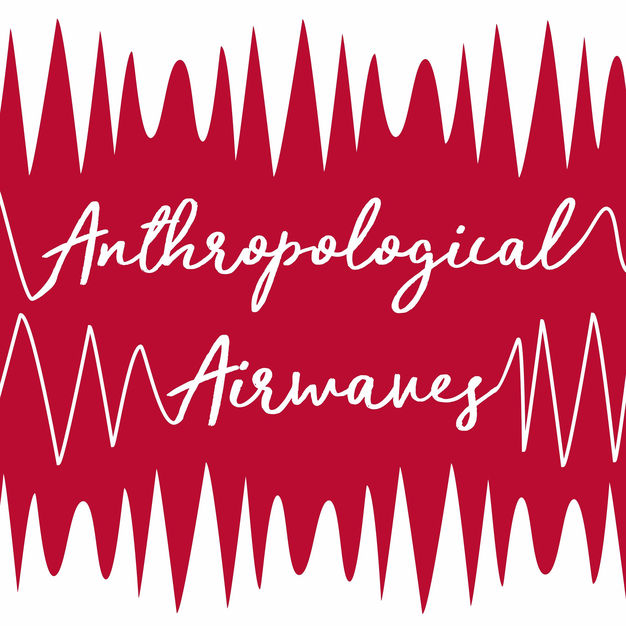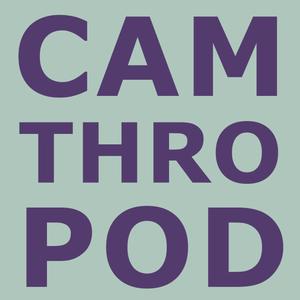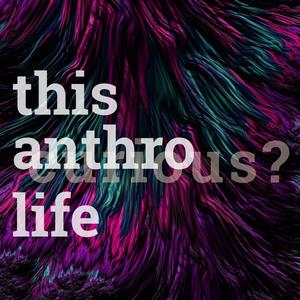
Anthropological Airwaves
Anthropological Airwaves
Anthropological Airwaves is the official podcast of the journal American Anthropologist. Building on the journal’s commitment to four-field, multimodal research, we host conversations about anthropological projects, from fieldwork and publishing to the discipline’s role in public debates. We aim to ask a series of fundamental questions about past, present, and future disciplinary practice, and to learn from those who chart new paths for a more broadly engaged anthropology.
- 40 minutes 7 secondsSeason 05 - Episode 04: Dismantling the Ivory Tower (Open Mic Edition) - Part Two
This episode is the second of a two-episode series on the production of archaeological knowledge in Lebanon produced by Nelly Abboud, contributing editor to the Archaeology Section at American Anthropologist. The series invokes the concept of an “open mic,” or a live show in which members of the audience–no matter their professional stature–take the stage to share their observations, critiques, and analysis. Nelly’s guests are early and mid-career archaeologists working in archaeology and museum worlds that remain elitist and exclusively reserved for members of a privileged and well-established social class. In each episode, she gives the metaphorical floor to a young voice in Lebanese archaeology and asks them to discuss their career within this system and the place of archaeology in contemporary Lebanese public life.
Today, we hear from Dr. Sarah Mady, lecturer in anthropology at Fordham University. Before moving to the United States in 2015, Sarah was a full-time field archaeologist and a research assistant at the University of Balamand, where she had been building a career since 2006. In this episode, Sarah connects the current state of the field of Lebanese archaeology to decades of colonialism, politics, sectarianism, and elitism.
Nelly Abboud is a freelance museum educator, founder, and director of Museolab, a cultural Lab that works on promoting cultural heritage through the use of experiential learning tools and methods. She is also a researcher interested in heritage and museum studies, cultural memory, public archaeology, and social collective impact.
Dr. Sarah Mady holds a Ph.D. from Graduate Center of the City University of New York. She is an adjunct lecturer at Fordham University. Her research studies healing shrines in North Lebanon and the ways in which women and mothers have produced and used these spaces as a part of their daily lives and lived religion.
NB: Since this episode was recorded, Sarah Mady has successfully completed her doctoral studies and now holds a PhD in Archaeology from the Graduate Center of the City University of New York.Credits:
Writing, Production, & Editing: Nelly Abboud Production Support: Anar Parikh Thumbnail Image: Sarah Mady Featured Music: ‘Hanging Moon’ by Le Trio Joubran Executive Producer: Anar Parikh
29 August 2023, 2:00 pm - 31 minutes 9 secondsSeason 05 - Episode 03: Dismantling the Ivory Tower (Open Mic Edition) - Part One
This episode is the first of a two-episode series on the production of archaeological knowledge in Lebanon produced by Nelly Abboud, contributing editor to the Archaeology Section at American Anthropologist. The series invokes the concept of an “open mic,” or a live show in which members of the audience–no matter their professional stature–take the stage to share their observations, critiques, and analysis. Nelly’s guests are early and mid-career archaeologists working in archaeology and museum worlds that remain elitist and exclusively reserved for members of a privileged and well-established social class. In each episode, she gives the metaphorical floor to a young voice in Lebanese archaeology and asks them to discuss their career within this system and the place of archaeology in contemporary Lebanese public life. The series begins with reflections from Lebanese archaeologist Lorine Mouawad about the nature of the archaeological field in Lebanon and how Ottoman and French colonial mentalities continue to inform how the field is managed. She shares her thoughts on the current state of the field and these sociopolitical entaglements in the context of her own experience as a field archaeologist.
Credits:
Producer: Nelly Abboud
Executive Producer - Anar Parikh Featured Music: "Relative Serenity Houdou’ Nisbi هدوء نسبي,” by Ziad Rahbani.25 July 2023, 1:00 pm - 55 minutes 12 secondsSeason 05 - Episode 02: What Was Moria and What Comes Next?
This episode features a conversation between Dr. Yannis Hamilakis and Dr. Naor Ben-Yehohada about Moria, once the largest refugee camp in Europe until it was completely destroyed by a fire in September 2020. Dr. Hamilakis had been researching, experiencing, and witnessing the materiality of contemporary migration on Lesvos, the Greek island where Moria was located, since 2016. And, in the aftermath of its destruction, he convened a cohort of archaeologists, social anthropologists, activists, teachers, and authors with direct connections to and experiences of Moria to reflect on what the place meant to them and possible directions for the future. These contributions came together in the form of a multimodal portfolio, “What Was Moria and What Comes Next?” comprising research and photo essays, ethnographic fiction, first-person accounts, lyrical prose, illustration, and more. Dr. Hamilakis’s introduction to the collection, was published in the February 2022 issue of American Anthropologist and the entirety of the collection is available open-access on the journal’s website. To round out the multimodal scope of this project, this episode contributes an oral and aural dimension to the reflections to “What Moria and What Comes Next?”
What Was Moria and What Comes Next?
Credits:
Producer: Anar Parikh
Executive Producer - Anar Parikh Featured Music: "Vertigo feat. Sponty" by Krav Boca6 June 2023, 1:42 pm - 30 minutes 48 secondsSeason 05 - Episode 01: Who's Afraid of Universals
In this episode, a professor-student pair, Dr. Atreyee Majumder and Manhar Bansal, provide a glimpse into their ongoing conversation on the enduring role of universal categories and their relationship to anthropological knowledge. In light of the discomfort around universals in contemporary social sciences, we offer the provocation: can there be universals beyond those of capitalist modernity? We talk about the dominant time-space compression account of modernity, the possibility of uncovering other, more liberating and revolutionary temporalities, and the fun of doing theory in anthropology. We argue for the need to revisit the question of universal categories to think through our time and politics, albeit on a broader canvas. Tune in to ask, along with us, who’s afraid of universals?
Further Reading:
Bauman, Zygmunt. 2000. Liquid Modernity. Cambridge: Polity Press. “Time/Space” pp 91-129.
Li, Darryl. 2020. The Universal Enemy: Jihad, Empire, and the Challenge of Solidarity. Palo Alto, CA: Stanford University Press. “Introduction” pp 1-26.
Tsing, Anna L. 2005. Friction: An Ethnography of Global Connection. Princeton: Princeton University Press. “Introduction” pp 1-20.
Walker, Gavin, and Naoki Sakai. 2019. “The End of Area.” Positions: Asia Critique 27(1): 1–31.
Credits:
Writing, Production & Editing: Atreyee Majumder
Executive Producer - Anar Parikh
Thumbnail Image: "Railroad Sunset" by Edward Hopper (1929)
Featured Music: "Air on a G String" by J.S. Bach2 February 2023, 2:32 pm - 32 minutes 1 secondSeason 04 - Episode 05: Archaeological Identities, Part 3
This episode is the third (final) installment of a three-part series produced by Eleanor Neil, contributing editor at American Anthropologist and Anthropological Airwaves. From the African American Burial Ground in New York City to the memorialization of violence in Northern Ireland to professional archaeology in the eastern Mediterranean, Eleanor asks archaeologists with different regional and methodological specialties to choose a single object or site, and, in their own words describe how this this site or artefact speaks to the interaction between archaeology and political or social identity across time and place. Here, Eleanor, an archaeologist herself, takes up the very prompt she posed to Dr. Cheryl Janifer LaRoche and Dr. Laura McAtackney in first two episodes of the series: to consider the role archaeology plays in the creation of contemporary political social discourses in the context of her own research on community archaeology on the eastern Mediterranean island of Cyprus.
Further Reading:
Counts, Derek B., and Elisabetta Cova, P. Nick Kardulias, Michael K. Toumazou. “Fitting In: Archaeology and Community in Athienou, Cyprus.” Near Eastern Archaeology 76, no. 3 (2013): 166-177.
Counts, D.B. “A History of Archaeological Activity in the Athienou Region.” In Crossroads and Boundaries: The Archaeology of Past and Present in the Malloura Valley, Cyprus, Annual of ASOR 65, edited by M. K. Toumazou, P. N. Kardulias, and D. B. Counts, 45–54. Boston: American Schools of Oriental Research, 2012.
Credits:
Writing, Production & Editing: Eleanor Neil Editorial
Production Support: Anar Parikh
Thumbnail Image: Eleanor Neil
Featured Music: “Westlin’ Winds” by Eoin O’Donnell
Intro/Outro Music: "Waiting" by Crowander
28 September 2022, 7:17 pm - 34 minutes 16 secondsSeason 04 - Episode 04: Archaeological Identities, Part 2
This episode is the second of a three-part series produced by Eleanor Neil, contributing editor at American Anthropologist and Anthropological Airwaves. From the African American Burial Ground in New York City to the memorialization of violence in Northern Ireland to professional archaeology in the eastern Mediterranean, Eleanor asks archaeologists with different regional and methodological specialties to choose a single object or site, and, in their own words describe how this this site or artefact speaks to the interaction between archaeology and political or social identity across time and place. In this episode, Dr. Laura McAtackney, discusses the materiality of violence and partition, the nature of commemoration and how archaeology of the recent past has an integral role in our understandings of politics, society and conflict. Dr. McAtackney is an associate professor at Aarhus University and her research centres on the historical and contemporary archaeologies of institutions and colonialism in Ireland.
Further Reading:
McAtackney, Laura. “Materials and Memory: Archaeology and Heritage as Tools of Transitional Justice at a Former Magdalen Laundry.” Éire-Ireland 55, nos. 1 & 2, (Spring/Summer 2020): 223-246.
MacAirt, Ciarán. "Corporate memory and the McGurk's Bar Massacre: CQ&A automatically added to new episodes on Spotifiarán MacAirt writes about the murder of his grandmother and 14 other civilians in a Belfast bar 43 years ago, and the families’ on-going campaign for truth." Criminal Justice Matters 98, no. 1 (2014): 6-7.
Justice for Magdalenes Research - an online resource associated with the NGO, Justice for Magdalenes.
Credits:
Writing, Production & Editing: Eleanor Neil
Production Support: Anar Parikh
Executive Producer - Anar Parikh
Thumbnail Image: Photo by Freya McClements for the Irish Times
Featured Music: “Westlin’ Winds” by Eoin O’Donnell
Intro/Outro: "Waiting" by Crowander
19 July 2022, 3:30 pm - 28 minutes 45 secondsSeason 04 - Episode 03: Archaeological Identities - Part 1
This episode is the first of a three-part series produced by Eleanor Neil, contributing editor at American Anthropologist and Anthropological Airwaves. From the African American Burial Ground in New York City to the memorialization of violence in Northern Ireland to professional archaeology in the eastern Mediterranean, Eleanor asks archaeologists with different regional and methodological specialties to choose a single object or site, and, in their own words describe how this this site or artefact speaks to the interaction between archaeology and political or social identity across time and place. Here, Dr. Cheryl Janifer LaRoche discusses the African American Burial Ground in lower Manhattan and the influence it has had on public engagement, perceptions of slavery in the northern United States, and the empowerment inherent in recognizing one’s own past in the archaeological record. Dr. LaRoche’s is Associate Research Professor at the University of Maryland School of Architecture, Planning, and Preservation. Her research on 18th and 19th-century free Black communities, institutions, and spaces combines law, history, oral history, archaeology, geography and material culture to define Black cultural landscapes, often navigating the convergences of public, private, political and social interests.
Further Reading:
LaRoche, Cheryl J. and Michael L. Blakey, ‘Seizing Intellectual Power: The Dialogue at the New York African Burial Ground’, Historical Archaeology, Vol. 31, No. 3 (1997), pp. 84-106.
Leone, Mark P. and Cheryl J. LaRoche, Jennifer J. Babiarz, ‘Archaeology of Black Americans in Recent Times’, Annual Review of Anthropology, Vol. 35 (2005), pp. 575-598. Transcript:
Credits:
Writing, Production & Editing: Eleanor Neil
Production Support: Anar Parikh
Executive Producer - Anar Parikh
Thumbnail Image: Wally Gobetz, “NYC - Civic Center: African American Burial Ground National Monument” (2008) African American Burial Ground Memorial
Featured Music: “Spirit Blossom” by Roman Belov
Intro/Outro: "Waiting" by Crowander
22 June 2022, 1:00 pm - 45 minutes 50 secondsSeason 04 - Episode 02: The Myth of Closure
In this episode, guest producer Laura Cirilo examines how the idea of closure configures into international applications of forensic anthropological practice in conversation with Dr. Sarah Wagner, Professor of Anthropology at the George Washington University, and Dr. Mercedes Salado, a member of the Argentine Forensic Anthropology Team. The episode was produced as a part of the Vital Topics Forum, "How Academic Diversity is Transforming Scientific Knowledge in Biological Anthropology" in Volume 121, Issue 2 of American Anthropologist.
Credits:Production & Editing: Laura Cirilo
Writing: Jaymelee Kim, Cate Bird, and Davette Gadison
Thumbnail Image: Jaymelee Kim
Additional Editorial Support - Elaine Chu and Matt Go
Executive Producer - Anar Parikh
Intro/Outro Music: "Waiting" by Crowander"
25 May 2022, 12:00 pm - 20 minutes 56 secondsSeason 04 - Epiosde 01: "I'm Indigenous, Not Mestizo:" The Art & Activism of Rapper Jaguar Arreola - Part 3
In this three-part series, Brown University PhD Students Benjamin Salinas and Adelaida Tamayo examine questions of art, activism, and identity in conversation with Jaguar Arreoloa, an Indigenous-Chicano rapper based in Los Angeles, California. In Part Three (The Debrief), Ben and Adelaida reflect on the interview with Jaguar, what they found inspiring, and each of their key takeaways from the process of creating the episode.
Credits:
Production & Editing: Adelaida Tamayo and Benjamin Salinas
Executive Producer: Anar Parikh
Background Music: Benjamin Salinas
Intro/Outro: "Waiting" by Crowander"
25 February 2022, 5:00 pm - 47 minutesSeason 04 - Epiosde 01: "I'm Indigenous, Not Mestizo:" The Art & Activism of Rapper Jaguar Arreola - Part 2
In this three-part series, Brown University PhD Students Benjamin Salinas and Adelaida Tamayo examine questions of art, activism, and identity in conversation with Jaguar Arreoloa, an Indigenous-Chicano rapper based in Los Angeles, California. In Part Two (The Interview), Adelaida and Ben interview Jaguar Arreola about his music and his activism.
Credits:
Production & Editing: Adelaida Tamayo and Benjamin Salinas
Executive Producer - Anar Parikh
Featured Music:
"Easy Does" It - Ez E
"Fuerza Guerrera II" - Jaguar Arreola, produced by Accosta the Man
Another Day by Kozmik Force feat. Azomali, produced by Acosta the Man.
Background Music: Benjamin Salinas
Intro/Outro Music: "Waiting" by Crowander"
23 February 2022, 8:46 pm - 30 minutes 4 secondsSeason 04 - Epiosde 01: "I'm Indigenous, Not Mestizo:" The Art & Activism of Rapper Jaguar Arreola - Part 1
In this three-part series, Brown University PhD Students Benjamin Salinas and Adelaida Tamayo examine questions of art, activism, and identity in conversation with Jaguar Arreoloa, an Indigenous-Chicano rapper based in Los Angeles, California. In Part One (The Planning), the series begins with a conversation between Adelaida and Ben as they prepare for their interview with Jaguar.
Credits:
Production & Editing: Adelaida Tamayo and Benjamin Salinas
Executive Producer: Anar Parikh
Background Music: Benjamin Salinas
Intro/Outro Music "Waiting" by Crowander"
21 February 2022, 5:00 pm - More Episodes? Get the App
Your feedback is valuable to us. Should you encounter any bugs, glitches, lack of functionality or other problems, please email us on [email protected] or join Moon.FM Telegram Group where you can talk directly to the dev team who are happy to answer any queries.
 Camthropod
Camthropod
 Anthropologist On The Street
Anthropologist On The Street
 The Familiar Strange
The Familiar Strange
 This Anthro Life
This Anthro Life
 AnthroTalking
AnthroTalking